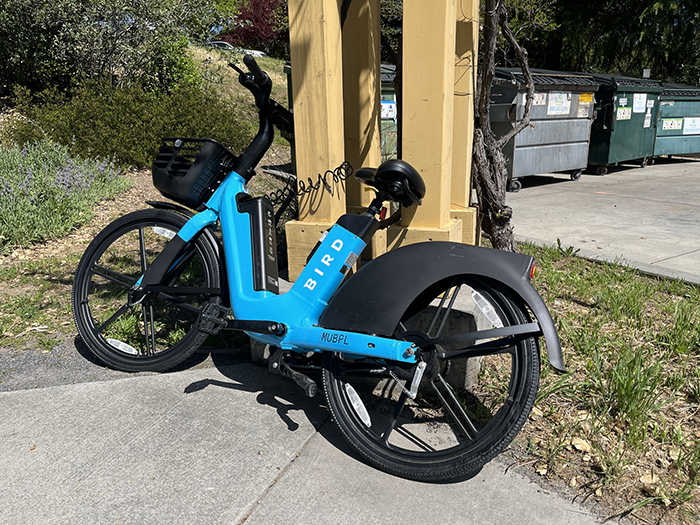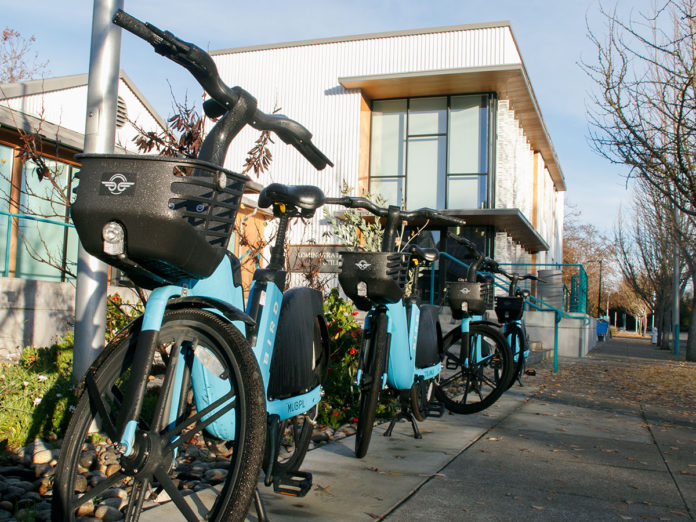Rudy Giuliani wasn’t the only one to declare bankruptcy on Dec. 20. Bird Global, the electric scooter and bike company that provides transportation vehicles by the hour in Healdsburg, Windsor and more than 300 other cities around the world, filed for Chapter 11 bankruptcy protection in federal court in Florida the same day.
The Miami-based company, once valued at $2.5 billion by investors, will use the bankruptcy proceeding to clear the way for the sale of its assets during the next 90 to 120 days. But there’s little indication the action will have any effect on Healdsburg’s Bird Bikes program—at least not yet.
“Bird will still be providing our micro-mobility services in Healdsburg and the other communities that we currently operate in,” said Garrett Gronowski, the company’s government partnership manager. “So the Birds will remain on the ground!”
Gronowski distributed a message to partner municipalities, including the Healdsburg Public Works department, on Wednesday, indicating that the restructuring was “aimed at strengthening its balance sheet and better positioning the company for long-term, sustainable growth for its US operations …”
The message put a positive spin on the bankruptcy. “This announcement represents a significant milestone in our company’s financial transformation. Our company is making progress toward profitability and aims to accelerate that progress by right-sizing our capital structure through this restructuring,” it read.
Chapter 11 bankruptcy is a not-uncommon way for corporations to reorganize without having to liquidate all their assets. It differs substantially from Chapter 7 bankruptcy, which does call for asset liquidation.

Gronowski’s announcement outlined the financial recovery plans for Bird and a recently acquired similar micro-mobility operator called Spin. “As part of our restructuring, Bird and Spin’s parent company’s lender is providing $25M in financing with the intention of fully supporting our local operations teams, paying permit-related fees, and continuing to operate a safe, reliable, and sustainable transportation service. Our plan is to operate with the same local teams and level of performance you have come to expect,” the message read in part.
The announcement said the $25 million would be used “to fund normal operations—including upholding city commitments—during this process. To be clear, we do not expect to go out of business.”
The implementation of Bird’s service in Healdsburg began in 2022, when it picked up the initiative from Zagster, a similar company that itself went bankrupt during the pandemic shutdown. The city council in September 2022 contracted with Bird Global to provide the distinctive blue electric bikes, holding that funding the program was in keeping with its sustainability goals of reducing greenhouse gasses emissions.
Yet complaints, primarily from Healdsburg residents, plagued the operation from the outset. They included reports of bikes left in neighborhoods for days at a time, sometimes parked on sidewalks or in other public-access areas. While Bird encouraged its users to park in an aptly named “Nest,” or congregation point for the bikes (usually in public areas such as the Plaza or the city’s parks), no mechanism existed to prevent random drop-offs.
Bikes left in diverse locations around the city are supposed to be picked up and moved back to key locations by the Fleet Manager, but for long periods earlier this year service was slow, as effective fleet managers proved difficult to find.
But things may have gotten better, according to Zimmer. “Recently the service from the Fleet Manager has been quite good, and the complaints have almost completely stopped,” he said.
More information at bird.co.









